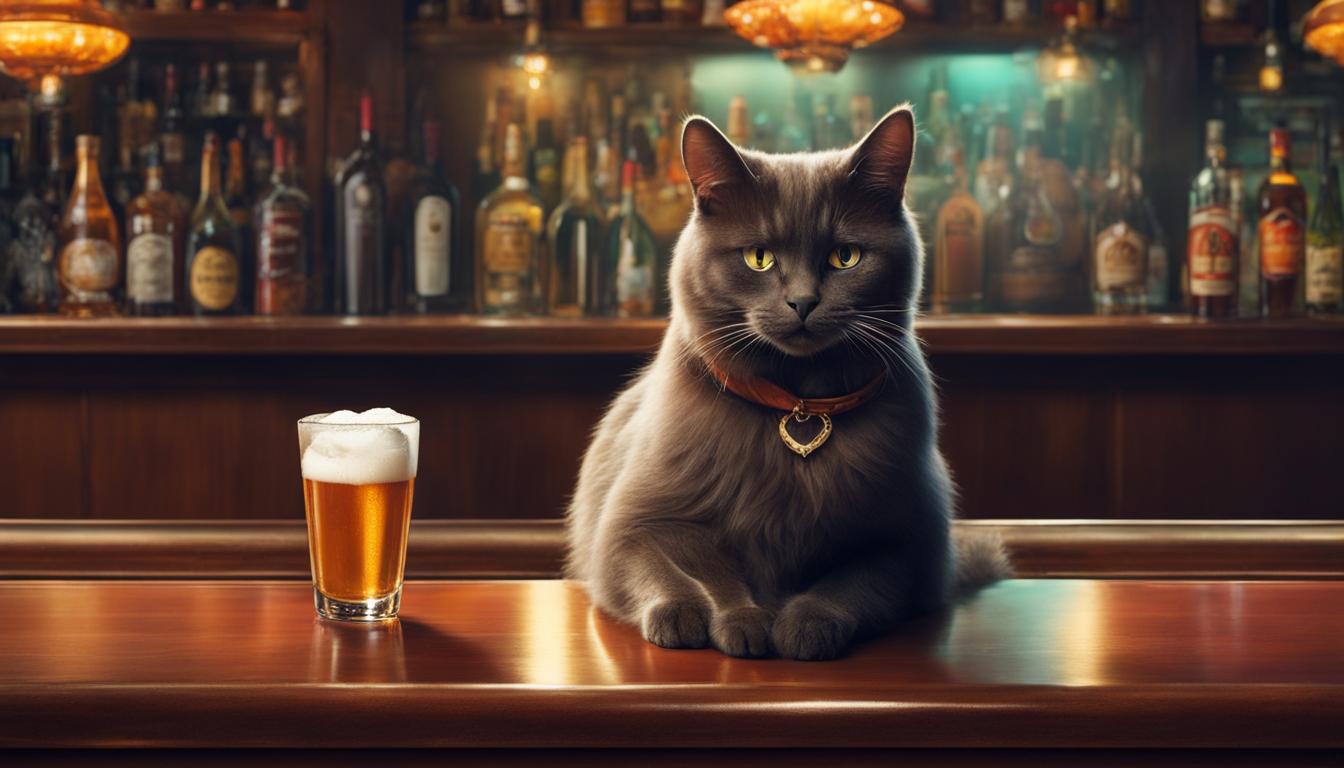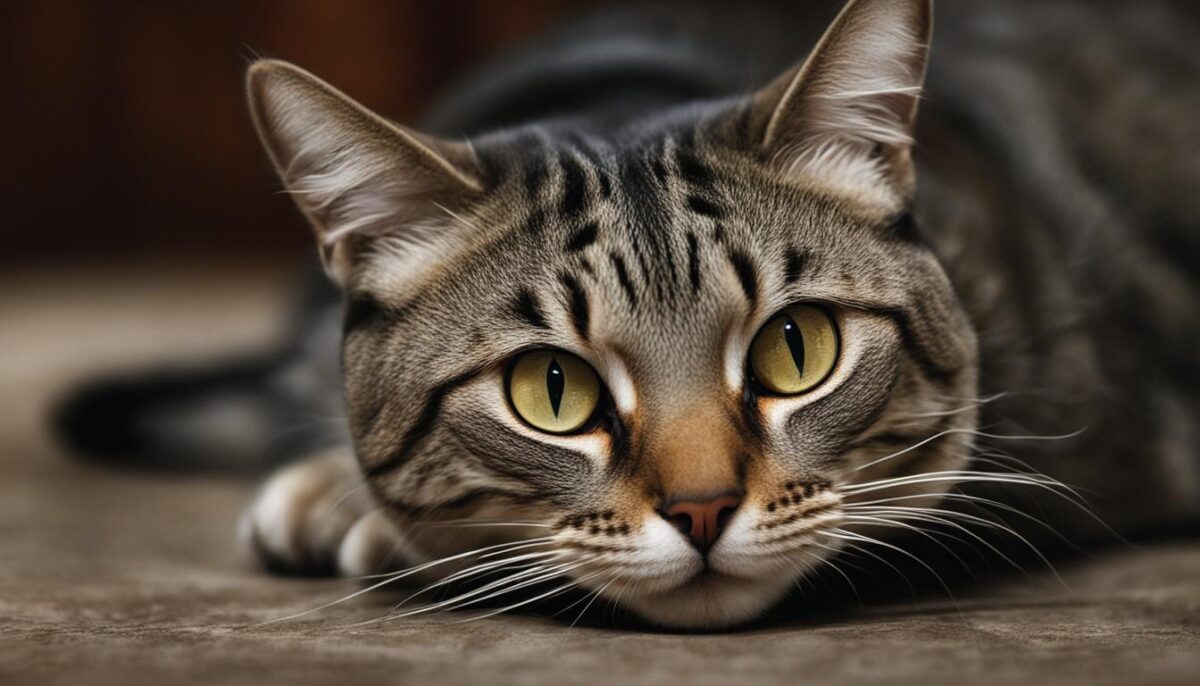As a caring pet owner, your cat’s safety is very important. You may have seen cats look curious about different things we drink, like when a cat sniffs at a glass of wine or beer. But, did you know that drinks with alcohol in them are not safe for cats? It’s true! Cats are much smaller than people, and even a little bit of alcohol can be very bad for them. It could even make them very sick or worse. To keep your cat safe, do not let them have any alcohol and keep these drinks where your cat can’t get to them.
- Alcohol is not safe for cats at all.
- Small amounts of alcohol can be very harmful to cats.
- Keep your drinks in a place where cats cannot reach them.
- Never give your cat alcohol on purpose.
- If you think your cat has had alcohol, call the vet right away.
- Take care of your cat by knowing what is safe and what is not.
Understanding the Risks of Alcohol for Your Feline Friend
Did you know that even a small sip of alcohol is very dangerous for cats? It’s true! Cute kittens and grown-up cats should never have drinks like beer, wine, or any drink with alcohol in it. Cats are much smaller than people, and their bodies cannot handle alcohol. So, it’s super important to keep all alcoholic drinks away from your furry friends to make sure they stay safe and happy.
Why Alcohol Is a No-No for Kitty
Cats can get very sick from alcohol, and it can even hurt them a lot. When we say alcohol, we’re not just talking about drinks that grown-ups enjoy at parties or dinner. We also mean things like some kinds of mouthwash and hand sanitizers that can be found around the house. These things have stuff in them called ethanol or isopropanol, and these can be really harmful to little kitties if they lick it or drink it.
The Size Factor: Why Cats Are More Vulnerable
Cats are tiny creatures, much smaller than humans, and that’s why alcohol is more dangerous for them. A drop of alcohol for a person could be like a big glass for a cat. That means cats can feel sick and get poisoned from alcohol very quickly. It’s like how a tiny cupcake is a big treat for you, but a huge cake would be too much, right? Well, alcohol is something cats should never have, not even the tiniest bit.
Common Household Alcohols and Their Hazards
Sometimes, things around the house can have alcohol in them, and we might not know it. This is why it’s good to learn about what these things are and make sure they’re up high where cats can’t reach them. Some common household items that may contain alcohol include:
- Cleaning products
- Mouthwashes
- Certain hand sanitizers
Feline safety is something we should all think about. If you keep cats as pets, remember to look out for these items and keep them away from your cats. That way, your cats won’t accidentally get into them and become sick. Remember, it’s all about cat poisoning prevention!
Can Cats Get Drunk? The Science Behind Feline Alcohol Absorption
Ever wonder if our furry friends can get drunk like humans do? Let’s explore how alcohol affects our pets. Cats can feel the effects of alcohol, and it’s not a fun time for them. Why? Because of ethanol toxicity and their special body metabolism.
Cats are curious, but their bodies are different from ours. Their liver and kidneys work hard to get rid of toxins, including alcohol. Even a small amount, such as a teaspoon, can be very harmful. This is because cats are much smaller than humans and they process things differently. Picture this: what’s just a sip for you could be a big deal for your kitty.
Fun Fact: Did you know that a cat’s metabolism doesn’t handle alcohol the same way as a human’s? That’s why it’s super important to keep our drinks out of paw’s reach!
Not eating can also up the chance for alcohol poisoning in cats. It’s like when people have a strong reaction to alcohol on an empty stomach. Cats are similar in that way.
| Factor | Effect on Cats |
|---|---|
| Size | Even small amounts of alcohol can be toxic due to small body size. |
| Metabolism | Cats process alcohol differently, making it dangerous faster. |
| Empty Stomach | Just like in humans, not eating increases risks of alcohol effects. |
What’s the bottom line? Keep alcohol away from pets, just like you would keep it away from kids. They count on you to stay safe!
Recognizing the Symptoms: When to Worry About Your Cat
It’s scary to think that your cat could get into trouble with something like alcohol. If you’re worried that your kitty might have snuck a sip, there are certain signs of alcohol poisoning to look out for. Spotting these alerts can mean the difference between a quick recovery or a serious pet emergency. Remember, a little care in feline care goes a long way.
Physical symptoms are the first clues. Your cat’s body might react in ways that are hard to miss. Let’s look at these key signs so you know when to act fast.
Physical Symptoms of Feline Alcohol Poisoning
- Upset stomach
- Drinking more water than normal
- Feeling weak or tired
- Walking funny or not able to stand straight
- Shaky or twitchy muscles
- Having trouble breathing
- Passing out or not able to wake up
These symptoms are your cat’s way of saying, “I need help!” And when their actions start to change, it’s another sign something’s wrong.
Behavioral Changes That May Signal Danger
- A sudden burst of energy or acting too wild
- Drooling more than they usually do
- Tripping over their own feet or bumping into things
If you see your cat showing any of these signs after possibly getting into alcohol, it’s time to get help. Stay with them, keep them safe, and call your vet right away. Your quick thinking can make all the difference in a pet emergency. Be the hero your furry friend needs and show your feline care skills in action!
Immediate Steps: What to Do if Your Cat Consumes Alcohol
If you think your cat sipped some alcohol, you need to act fast. Cats can’t handle alcohol like people can, and it’s not safe for them. The first thing to do is to call for help.
Contacting Your Veterinarian or Pet Poison Helpline
Right away, pick up the phone and call your vet or the Pet Poison Helpline at (855) 764-7661. They are pros at helping pets that ate or drank things they shouldn’t. By getting help fast, you make sure your cat has the best chance to get better.
Treatment Options and Vital Care for Your Pet
If your cat has had alcohol, your vet might need to treat them with special care, like giving them water through a needle in their leg (that’s called IV fluids) or giving them medicine. It’s important for them to get a checkup, so your vet can make sure they’re okay.
| Problem | Who to Call | Treatment |
|---|---|---|
| Feline intoxication | Veterinarian / Pet Poison Hotline | IV fluids, medicine |
| Checkup needed | Veterinarian | Clinical assessment |
Remember, keeping your cat away from alcohol is the best way to avoid these scary times. If an accident happens, though, now you know what to do—call for emergency vet care and follow their advice to help your cat feel better.
Preventing Alcoholic Mishaps: Tips for Pet-Proofing Your Home
Keeping your furry friends safe from harm means making sure they can’t drink things that are bad for them, like alcohol. You love your pets, so you want to make your home a safe place. Here are some easy tips to pet-proof your home and help you in avoiding cat poisoning.
Always keep an eye on your drinks, especially when friends or family are over for fun times. Your sweet pet might try to sneak a sip when no one is looking. Make sure those tasty treats and drinks are far from paws’ reach.
When baking or using things like raw yeast dough, be sure your kitty or puppy isn’t in the kitchen. This dough can be really bad for them if they eat it. And if something spills, clean it up quickly. You don’t want tiny tongues licking up something that could hurt them.
- Make sure all trash cans have lids that lock so your pets can’t get into them.
- Put things like cleaning stuff and other products with alcohol in places your pets can’t get to.
By following these simple steps, you can make your home a pet-safe place and have fewer worries about your dear pets getting into things they shouldn’t. Remember, a little care goes a long way in protecting your furry family members.
The Truth About Alcohol-Based Products and Your Pet
Did you know that not all dangers for your furry friends come in a bottle with a label that says “do not drink”? Lots of everyday items in your home could be harmful to your cat if they take a taste. It’s not just about the alcohol in your glass; it’s about household toxins for cats hiding in common products you use often.
Dangers of Common Products Containing Ethanol
Be cautious, as many ordinary things like mouthwash, some fruits as they start to go bad, and even some medicines can be really bad for cats if they have alcohol in them. Cats are much smaller than us, and their bodies can’t handle these things well. It’s important to know about these hidden risks to keep your pet safe.
Cleaning Products and Sanitizers: Pet Safety Considerations
When keeping your home clean, it’s essential to choose pet-safe cleaning products. Stuff like rubbing alcohol, hand sanitizers, and window cleaners should always be kept where your cats can’t get them. These products are very strong and even a small amount can be very dangerous to your pets. Always talk to your vet before you use any products that might be ethanol dangers around your pets.
- Store all cleaning products in cabinets out of reach for curious kitties.
- Read labels to find pet-safe options.
- Wash away any spills right away.
By keeping an eye on these simple things, you can help make sure your cat doesn’t run into any dangerous surprises around your home.
Conclusion
As a pet owner, it’s your job to look after your cat and keep them happy and healthy. Part of this is making sure they are safe from things that can hurt them, like alcohol. By learning about the dangers and knowing what signs to watch out for, you can help avoid scary situations. If your cat gets into alcohol, you’ll need to act fast and get help from your vet.
Keeping your home safe for your furry family member is very important, too. You’ll want to make sure there’s nothing around that can make them sick, like drinks or cleaning things that have alcohol in them. This is part of being a responsible pet owner. By pet-proofing your home and being careful, you’re doing a great job at safeguarding your cat.
Remember, taking good care of your cat means keeping an eye on them and making sure they steer clear of anything that could be bad for them. Your cat depends on you to stay away from trouble. With your help, they can lead a safe and joyful life! That’s what pet welfare is all about.
FAQ
Is alcohol really that dangerous for cats?
Absolutely, alcohol is incredibly unsafe for cats and can lead to alcohol poisoning, which is potentially lethal. Cats are much more susceptible to the harmful effects due to their smaller size and different metabolism.
How much alcohol does it take to harm a cat?
Even a small amount of alcohol, which could be as little as a teaspoon, can be dangerous or even deadly to your feline friend. It’s important to prevent any access to alcoholic beverages.
What are the signs of alcohol poisoning in cats?
The signs can be both physical and behavioral, ranging from upset stomach, increased thirst, lethargy, and disorientation, to more severe symptoms like muscle tremors, paralysis, and seizures. Behavioral changes can include stumbling, drooling, and lack of coordination.
What should I do if my cat ingests alcohol?
If you suspect your cat has drunk alcohol, time is of the essence. Immediately call your veterinarian or the Pet Poison Helpline for advice. They will guide you on the necessary steps to ensure your pet’s safety and recovery.
How can I prevent my cat from being exposed to alcohol?
Keep alcoholic beverages out of reach of your cats, especially during gatherings. Ensure that substances like fermenting fruits, and liquid medications, which may contain alcohol, are also stored safely. Pet-proof your home by securing trash cans and keeping cleaning products that contain ethanol or isopropanol in secure cabinets.
Are there any household products that contain alcohol I should be wary of?
Yes, many everyday items such as mouthwashes, hand sanitizers, cleaning agents, and certain grooming products contain forms of alcohol like ethanol, methanol, or isopropanol. These should all be kept in pet-proof locations to prevent accidental ingestion by your cat.
What are the long-term effects of a cat ingesting alcohol?
Ingesting alcohol can have serious long-term health consequences for cats, including potential damage to the liver and kidneys. Frequent exposure or ingestion can worsen these outcomes, so it’s essential to keep alcohol away from your cats altogether.
Can the effects of alcohol on cats be treated?
With prompt treatment, cats can recover from the effects of alcohol poisoning. Veterinarians may administer IV fluids, medication, and other supportive care depending on the severity of the intoxication. That said, prevention is always the best approach.


